Push Poll Hackery
Manipulating public opinion with dubious survey research.

When I saw (via memeorandum) the headline “New National Poll: 89% of Americans Say Congress Should Focus on Addressing Inflation, Not Breaking Up Tech,” I chuckled. What a hamhanded push poll! Never having heard of the sponsor, NetChoice, I clicked through out of curiosity.
When I read the lede, I laughed hard:
Today, NetChoice, a trade association committed to making the internet safe for free enterprise and free expression, released a new national poll conducted by Echelon Insights. Our results found that voters are extremely concerned about soaring prices, and they blame President Joe Biden for it. They are also concerned that proposals to regulate tech will only further increase prices, and 89% of Americans say Congress should focus on addressing inflation rather than breaking up large tech companies.
The poll revealed that nearly two-thirds of Americans say the country is headed in the wrong direction, and as such, folks are enthusiastic to get out and vote in November. It surveyed 9,543 registered American voters nationally and in 14 states.
“The American people want Congress to prioritize inflation and economic instability, not beltway-born antitrust proposals that could raise prices,” said Steve DelBianco, President & CEO of NetChoice. “Ahead of the midterm elections, Congress should listen to voters and focus on the economy rather than passing bills that will hurt Americans, suppress competition, and increase inflation.”
This is some amateur hour hackery. Who would be fooled by such obviously slanted survey research?
Speaking of amateurish, how about these graphics?
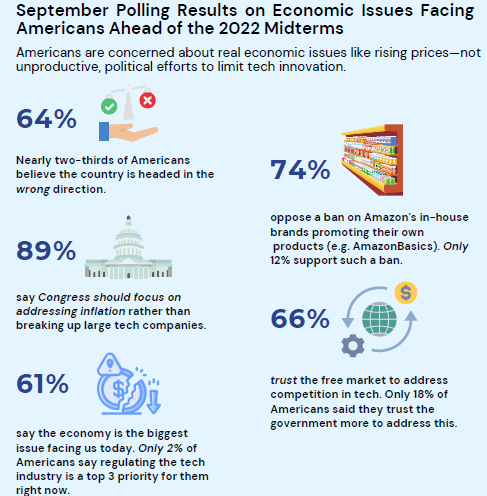
Here’s the weird part: if you actually click through and read the poll questions and methodology, there’s nothing obviously amiss. The questions are straightforward and not in any way leading. They rotate the order of questions to avoid biasing responses with sequencing. Most importantly, they don’t actually ask people to compare unlike things such as responding to inflation vs. regulating tech.
Nor does the sampling seem unusual. Joe Biden and Donald Trump are about equally unpopular, which is consistent with pretty much any polling I’ve seen. A majority hold unfavorable views of both the Democratic and Republican parties, with slightly more holding an unfavorable view of the GOP. And about a thrid of respondents have no opinion whatsoever of Ron DeSantis, which means it’s not a survey of self-selected political junkies.
The polling on NetChoice’s agenda comes rather late in the survey, starting with Question 42. (There are a slew of location-specific questions based on various election races, as well as some questions that are only asked of those answering Yes to an earlier question, so it’s not that late.)
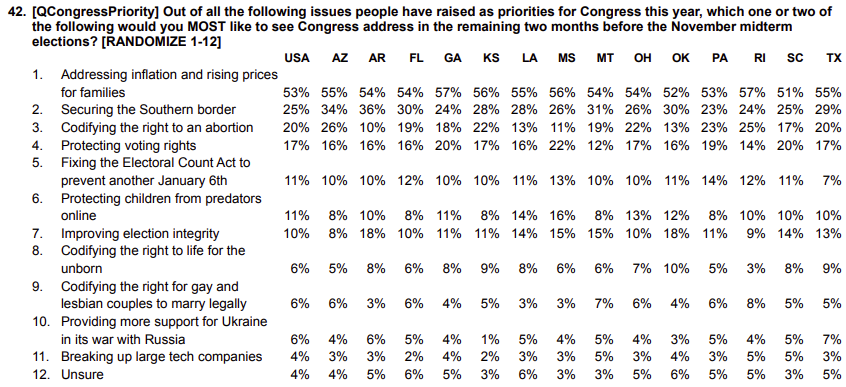
So, this is a little skewed. Maybe more than a little. “Addressing inflation and rising prices for families” is definitely loaded. And, lord have mercy, “Protecting children from predators”? Rather obviously, “Breaking up large tech companies”—which, in fairness, likely isn’t top of mind for the average voter to begin with—is naturally going to be outside the top 2 for just about everyone. Indeed, the fact that 4% of national respondents picked it actually tells us it’s more important to voters than I’d have guessed.
Still, I wouldn’t be all that upset with this question on its own. But then it’s followed by a slew of loaded ones that were primed by this one.
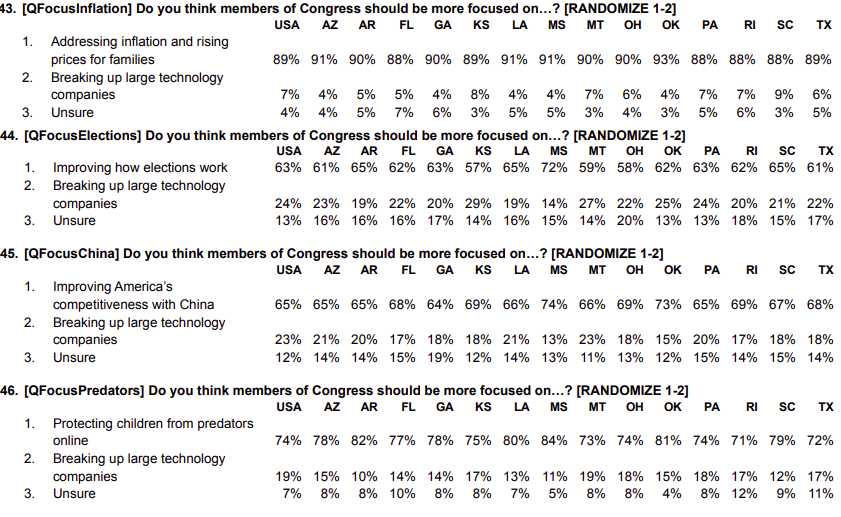
This is just laughably bad faith. They’re juxtaposing an anodyne issue—breaking up large technology companies—with emotionally charged ones. That they still got a fifth to a quarter of respondents picking the anodyne choice actually demonstrates the opposite of what they’re trying to show: it’s actually an important issue for a lot of people. Indeed, more important than I’d have guessed.
The next questions are more of the same but even more silly:
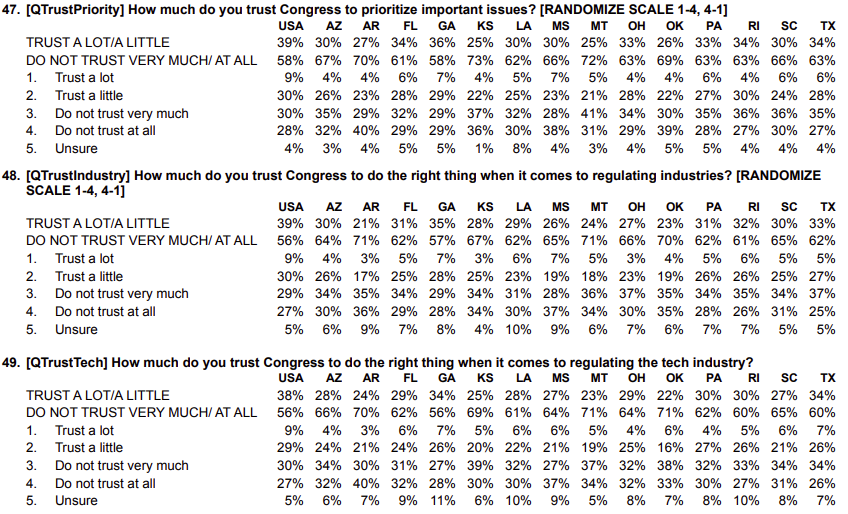
I, for one, am shocked that a majority of Americans do not trust Congress to do the right thing. On any issue.
Finally, having primed respondents with 1) the comparative lack of salience of this issue and 2) their distrust of Congress, they go in for the coup de grace:
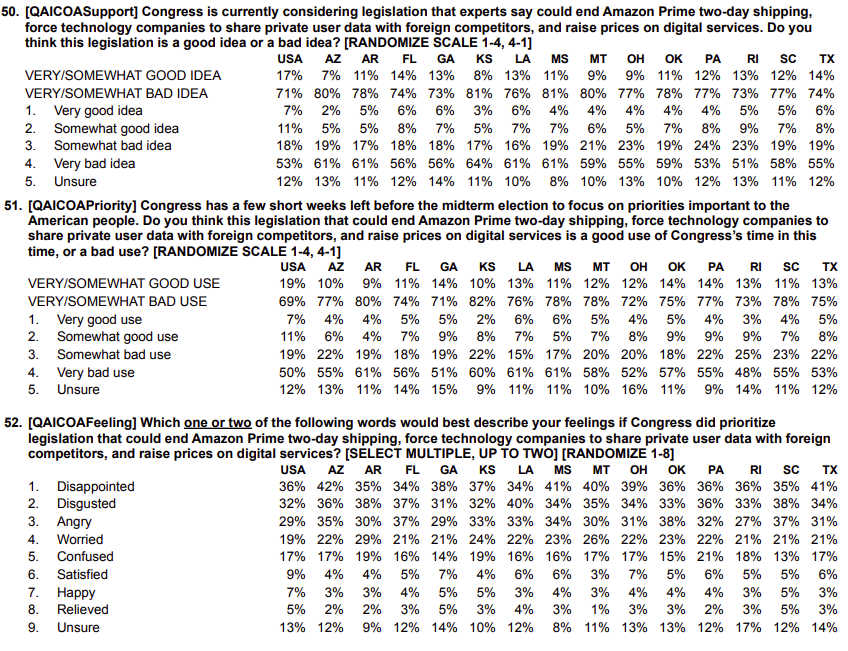
There are a few more along those lines, but you get the idea. Truly a genius bit of hack work here.
One presumes Amazon commissioned the poll, since they’re the only company mentioned by name and they’re named multiple times. I don’t think Amazon Prime constitutes a monopoly and tend to think Congress shouldn’t break the company up, despite its behemoth status. I’m just a wee bit less firm on those positions after this.





My favorite was one I got in the mail years ago, “Who should control companies, the owner or communist union leaders?” Yes, they really said communist.
This polling supports TV commercials with the same theme, but more vague, ‘Congress should focus on inflation rather than something, something competitive advantage’. Leaves one asking, “What the heck was that about?” But they do ask the viewer to contact their congress person. I’d be curious what the few people who do contact a congressman actually say.
Rasmussen topics (much derived from Fox News) and questions are equally ridiculous. I have learned that even asking any question on any topic will create its own inherent bias, after all who will protect us from pedos (question 46 above). I think modern technologies have indeed affected the polling industry: the drive for content has had deleterious results.
Somebody help me out here. (Not an Amazon Prime member* and rarely even an Amazon customer at all.) What is it about two-day shipping that Congress believes in anti-competitive? Is Amazon preventing other companies from offering expedited shipping (not to any extent I’ve recognized, BTW)? Is it prohibiting competitors from collecting shipping charges ahead by the same sort of membership scam it’s running? Is it even an issue that Congress is addressing?
*Never been a fan of “membership shopping enterprises” of any sort. Don’t buy enough stuff to justify frontloading profit to the business in question. And even outside of commerce, I’m suspicious about holding membership in organizations that have people such as me for member to begin with. What are they up to?
To be fair, the question refers to “protecting children from predators online” — not just wolves, but wolves with wifi.